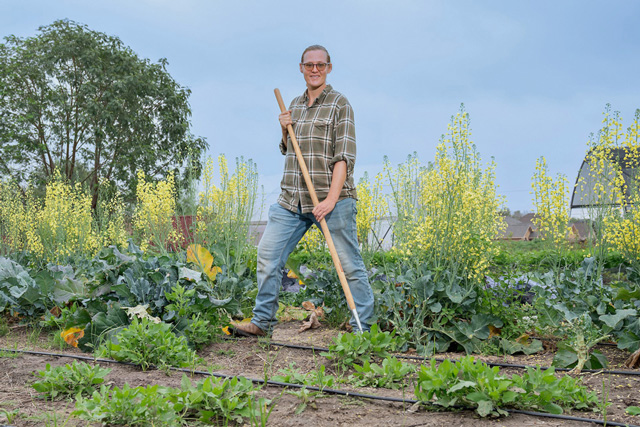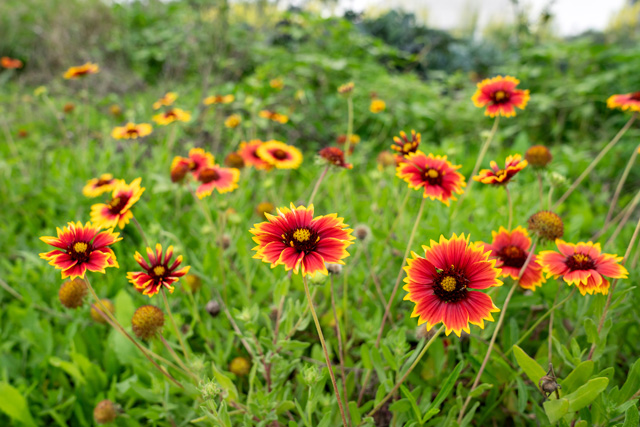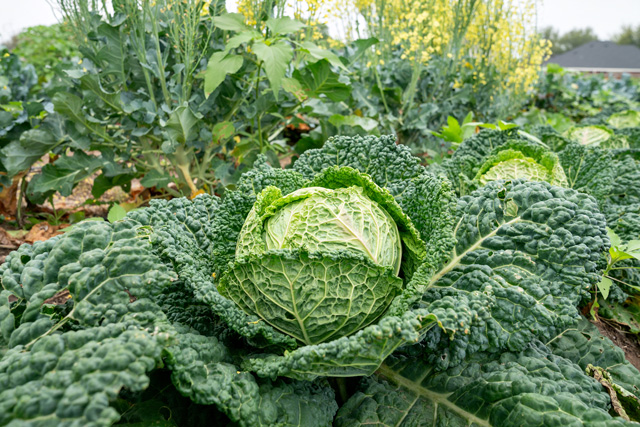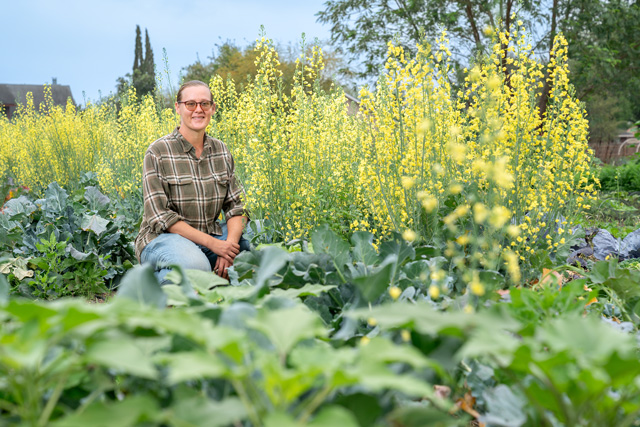Stephanie Kasper, program manager for the UTRGV Agroecology Program, oversees production of the Hub of Prosperity farm, a 5-acre research and education farm managed by the UTRGV Center for Sustainable Agriculture and Rural Advancement (SARA) and the UTRGV Agroecology Program. In recognition of Women’s History Month, Kasper and her collaborative team of women are being highlighted for their work in sustainable agriculture.
UTRGV’s Stephanie Kasper, on the importance of women in agriculture
Wednesday, March 27, 2024
Recognitions, Around Campus, Staff Highlights, Community
By Amanda A. Taylor-Uchoa
RIO GRANDE VALLEY, TEXAS – MARCH 27, 2024 – From planting crops to filling out paperwork for farm funding, there is no job too taxing or too dirty for Stephanie Kasper.
Kasper, program manager for the UTRGV Agroecology Program, oversees production of the Hub of Prosperity farm, a 5-acre research and education farm managed by the UTRGV Center for Sustainable Agriculture and Rural Advancement (SARA) and the UTRGV Agroecology Program.
Though Kasper has worked with UTRGV for a little more than seven years, her work and passion for agriculture stems from her childhood.
Standing in a vibrant field of blooming broccoli, one of the in-season crops currently growing at the farm, Kasper said she didn’t grow up on a farm.
“But my grandparents had a farm, so I really loved visiting them and spending time with my grandma’s chickens and goats,” she said.
Aside from broccoli, fresh produce such as cauliflower, cabbages, kales, lettuces, beets and radishes make their way from the soil to a farmer’s market stand on the farm that happens each week.
“From November through June is the season in the Valley where we harvest a lot of produce. We have a farm stand that happens every week here on the farm, so the students and I harvest whatever crops that come in,” she said. “This is a community farm, we’re growing food with our land and our labor, and we want that to stay and feed our people in the Valley.”

LIFE ON THE FARM
Kasper oversees various aspects of the farm, including crop schedules, taking care of the on-site chickens, and helping students with their coursework and demonstrations. It keeps her busy, she said, but the work also keeps her driven.
With the help of staff like Maria Gonzalez, program specialist on the farm and a grad student pursuing a master’s degree in Sustainable Agriculture, work on the farm becomes more streamlined.
“I help manage students and day-to-day tasks,” Gonzalez said. “I seed, I harvest, I weed, I do pest control, some computer work, sometimes, just preparing land, the plots, irrigation.
“I learned how to drive the tractor,” she said. “I help make sure everything is up to safety codes and going well in the fields.”
One of the biggest purposes of the farm is to be able to demonstrate sustainable agricultural practices, she said, and the farm is a “living laboratory” where UTRGV students attend classes and lectures and are able to apply their knowledge through hands-on experiences on the farm.
The practices on the farm extend to the community, as classes are often held to demonstrate a myriad of agricultural elements, like how to start your own garden and how to test soil.
With the hot summer months approaching, Kasper keeps a schedule of which crops are ready to be planted, using the aid of her staff and UTRGV students. Crops like tomatoes, squashes, cucumbers and melons are being prepared to be planted ahead of the upcoming summer months.
“It’s a really cool time of year where we can get all sorts of crops growing on the farm,” Kasper said. “Having access to this living lab helps students and the community see sustainable practices in action. It helps people get started in growing food for themselves.”
Through the weekly farmer’s market events, Kasper is able to help students see the fruits of their labors. It also is a way to help keep a higher percentage in profit within the community.
“We sell our produce to the community. The funds raised go back into the running of the farm, and any leftover produce goes to our student employees, our volunteers, or to the church, which runs a food pantry. We also donate to the food pantry on campus, so all of this stuff is finding a home locally,” she said.

Kasper views the ability to grow your own food as empowering. As a community collective, there is strength in numbers, she said.
“When we’re able to know a little bit more about how food is grown and then participate in that process ourselves, we appreciate all the struggles and difficulties that go along with it a little bit more,” she said. “Being involved in agriculture, even on a small scale like on your patio or balcony, puts us in touch with our food in a way that a lot of us have lost.”
Parents and grandparents were more involved in agriculture, she said, and there was more awareness of the work that went into farming, which generated a deeper appreciation of agriculture.
“Farming also helps with mental health,” Kasper said, recalling the beginning stages of the COVID-19 pandemic, when the farm not only was producing its first abundance of crops, but also acted as a safe space for students and staff.
“When you’re working with your hands, you can get your mind off of problems and other stresses in your life. I think this place really thrived during that time. It was so good for people to be able to spend time out here, as well,” she said.
Kasper, who has worked in small scale agriculture for about 10 years, used to work on family farms throughout Central Texas that catered mostly to local restaurants and the surrounding communities.
After meeting UTRGV’s Dr. Alexis Racelis, director of the Agroecology Program, at a Texas Organic Farmers and Growers Association conference, Kasper found that work in sustainable agriculture research was fascinating. That encouraged her to move from Victoria, Texas, to the Rio Grande Valley in 2017.
Kasper completed a two-year master’s program in Agricultural, Environmental and Sustainability Sciences and stayed on-staff to conduct her own research and manage the farm.
“Some things that I love about farming in an urban region is that it’s so much easier for people to access the farm or come spend a day or a few hours here to see what’s going on,” she said. “You can achieve more together than you’re able to do alone, and I think that’s something really powerful about our sustainable agriculture community here in the Valley.”

One of Kasper’s favorite things about working on the farm is being able to collaborate with a diverse team, especially in a field that has historically been run by men.
“I think a lot of us still imagine a farmer in our minds as being older, usually white men, but I think that model is on its way out,” she said. “Food is fundamental, it’s so important to all of us, and we need all of us in the production of it.”
As a woman working in agriculture in the Valley, Kasper said, she feels lucky to be a part of a community of women farmers who can help and learn from each other. She cites the time she had to learn about running farm equipment.
“When it comes to doing physical tasks with your body, sometimes I’ve had a hard time learning how to do these things by watching men do them because we have power centers in parts of our bodies different from men,” she said. “If you’re able to find a woman to demonstrate, even if it’s just on YouTube, I think that can go a long way.”
When she was learning to run the tractor, specifically, she would get advice on how to operate it that didn’t necessarily work within her capabilities. Taking the time to do her research and culling advice from other women farmers in the region helped Kasper learn the skills she needed. Today, she has become a mentor to other women working in farming.
“We have a lot of women who work out here on the farm and it can be easier when I’m able to teach them how to do something, instead of them having to learn from a man who will do it a little differently or who has a different strategy,” she said.
To further support women in agriculture, the farm will host a Women in Ag Workshop on March 28, in partnership with the USDA, SARA and Prairie View A&M University.
Running from 8:30 a.m. to 2:30 p.m., the event will cover various aspects of farm life, through informational presentations and demonstrations, hearing stories from local farmers, and learning about business planning.
“We have a really fun start to the event; we’re going to have goat yoga on the farm,” Kasper said. “It should be a great educational day and really fun to bring together our women in the agriculture community. I think it’s special to be able to celebrate the strengths of our women farmers.”
For more information on the event, email aisha.cruzreyes@utrgv.edu.

ABOUT UTRGV
The University of Texas Rio Grande Valley (UTRGV) was created by the Texas Legislature in 2013 as the first major public university of the 21st century in Texas. This transformative initiative provided the opportunity to expand educational opportunities in the Rio Grande Valley, including a new School of Medicine and a School of Podiatry, and made it possible for residents of the region to benefit from the Permanent University Fund – a public endowment contributing support to the University of Texas System and other institutions.
UTRGV has campuses and off-campus research and teaching sites throughout the Rio Grande Valley including Brownsville (formerly The University of Texas at Brownsville campus), Edinburg (formerly The University of Texas-Pan American campus), Harlingen, Weslaco, McAllen, Port Isabel, Rio Grande City and South Padre Island. UTRGV, a comprehensive academic institution, enrolled its first class in the fall of 2015; the School of Medicine welcomed its first class in the summer of 2016, and the School of Podiatric Medicine in the fall of 2022.
